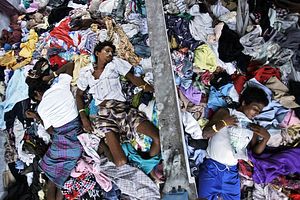At a recent conference in Kuala Lumpur, Tan Sri Dr. Jemilah binti Mahmood, under secretary general for partnerships at the International Red Cross, stressed the need to reframe the discussion on humanitarian assistance along the lines of delivering aid while ensuring the respect of victims remain intact. Specifically, she mentioned her strong preference to delivering cash-based assistance as opposed to other forms of aid as this allows recipients the dignity of being able to choose where and what to spend on.
The debate over the merits of cash versus in-kind assistance has largely been settled over the past decade as data has emerged from various conflict zones showing the superiority of cash during emergencies for those in need. Cash, in the form of electronic vouchers, physical money or mobile credit, generally grants victims the ability to prioritize their most urgent needs in spending. Additionally, cash assistance cuts the substantial costs of transport and delivery for aid agencies. In-kind assistance, normally in the form of food rations, clothing or medical supplies, can be of tremendous value in the immediate aftermath of a disaster or conflict but can also be restrictive over time. Victims may end up in a dependency trap as aid agencies paternalistically assume they know the concerns of people better than they do. However, despite the clear advantages of cash-based assistance, globally such aid still only accounts for a lowly 6 percent.
In Malaysia, refugees mostly do not have access to cash-based programs and aid to them is normally delivered in the form of items. As the government has not signed the 1951 UN Refugee Convention, refugees in the country have an unclear legal status, receive little aid directly from the state and are heavily reliant on a scattered network of NGOs and the UNHCR.
Humanitarian assistance to refugees depends to a large degree on private donors from Malaysian civil society. Many of these aid disbursements take place almost seasonally, such as during Ramadan, when refugees are likely to have sponsored meals or receive gifts. As well-intentioned as these charity measures may be, the sporadic nature of such assistance along with the inherent limitations around purely in-kind contributions still leave refugees facing insecurity in their day-to-day struggles.
Many local donors may be resistant to the idea of cash assistance given their concerns over traceability of funds and the ease of accounting for paid items rather than spending habits of individual refugees. Some may also be concerned with not giving a perception of subsidizing refugees at the expense of locals who are also financially needy. The practice of in-kind assistance has also become ingrained in the way many NGOs deal with refugees, and switching to a more consolidated cash disbursal system may end up reducing the need for several running charity packages.
There are a few existing initiatives in Malaysia that are seeking to bridge this humanitarian aid gap while affording more choice and flexibility to refugees. For instance, Taylors Education Group and CIMB Bank together recently conducted an entrepreneurial grant program in which both low income locals and refugees pitched for grants awarding them items to use to expand their businesses, designed not as charity but as a means to enhance their existing livelihoods. The Malaysian Social Research Institute (MSRI) just launched a Food Voucher Assistance Program in which refugees and asylum seekers can use the vouchers to purchase items of necessity themselves rather than depend on food rations. Later this year, our Rohingya Project is set to carry out a pilot with UNHCR in which refugees can earn cryptotokens based on hours spent doing community service, which can be redeemed for product or service rewards of their own interest.
Presently though, cash is nowhere near the king when it comes to helping this population. But as fintech continues to shift and expand the development sector, the hope is that refugees and other marginalized populations in Malaysia can benefit from more financial options in the near term.
Saqib Sheikh serves as project director of the Rohingya Project, a grassroots initiative for financial inclusion of stateless Rohingya worldwide, as well as adviser/co-founder for the Refugee Coalition of Malaysia (RCOM), a network of 14 refugee communities based in Malaysia.

































